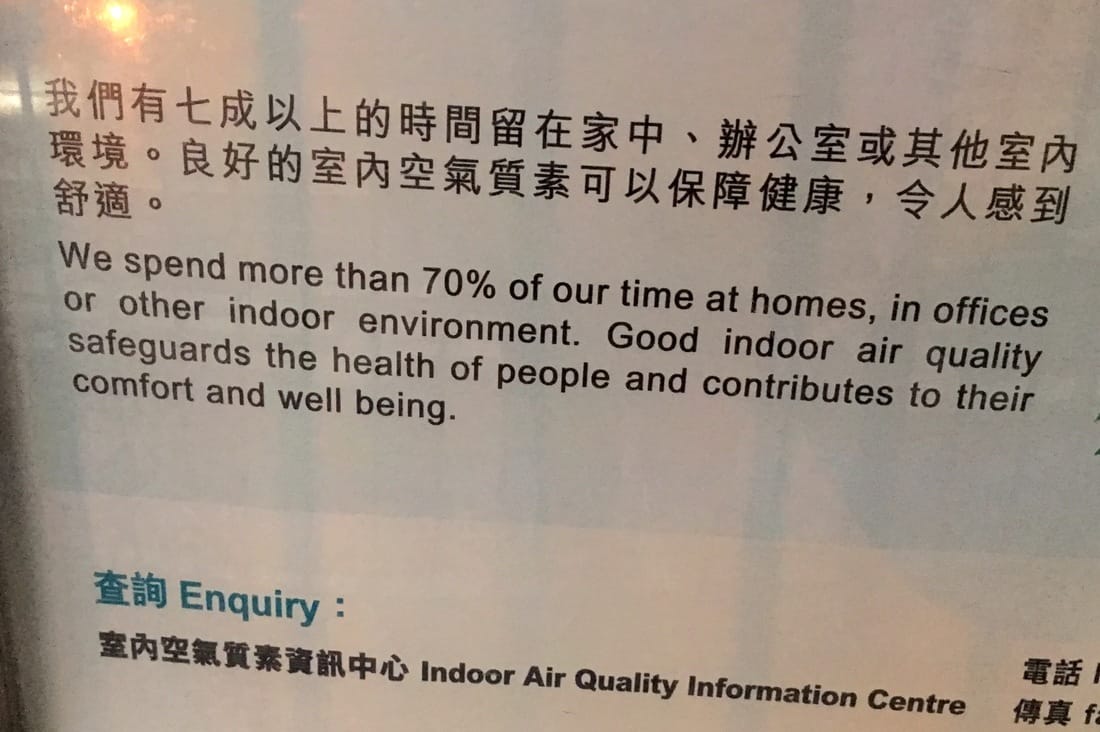|
On the Cygnet Facebook page, I challenged readers to locate 5 problems with the English sentences in this short paragraph on a poster put out by the Indoor Air Quality Information Centre. Here's my list. If you think I've missed any, let me know! 1) 'at homes'. In English, if we want to talk specifically about being inside the buildings where we live, we use 'in homes' (plural) -- just like the expression 'in offices' that comes next. You can see this kind of usage in a sentence like this one: "All across Hong Kong, in homes, in offices, in factories, in sports halls, people are working hard". The expression "in + plural countable noun" is very standard in English to describe possible locations for something. We cannot use the word 'home' in the singular after 'in'.
English also has the expression "at home", which means 'present at the place where one normally lives" (e.g. "I will be at home tomorrow morning, so come and have a cup of coffee then"). Here, 'home' is an uncountable noun and it cannot be pluralized in this expression. In summary, we have the option here of either using 'in homes' or 'at home' … but NOT of using 'in home' or 'at homes'! 2) 'other indoor environment'. The noun 'environment' is a countable noun in English. The determiner 'other' here without an article in front of it suggests that the countable noun that follows must be plural (e.g. we can say 'Other cars are faster' but not 'Other car is faster'). Therefore, the word 'environment' here should be plural (just like the nouns 'homes' and 'offices' that precede it). Generally in English, when we are using a countable noun in English to refer to all examples of something (as here), we use the plural form (e.g. 'Offenders will be prosecuted', NOT 'Offender will be prosecuted') 3) Parallel structure. The first sentence lists three kinds of places where we spend most of our time: homes, offices, other indoor environments. Wherever possible, English speakers prefer to place elements like this in a clear parallel structure. For example, they might use just one preposition to refer to all three parts, like this: We spend more than 70% of our time in homes, offices or other indoor environments. If the elements in the list require different prepositions, then each component in the list should have its own preposition (so that the structure remains parallel): We spend more than 70% of our time at home, in offices or in other indoor environments. 4) 'well being'. This is a compound noun, and all the major dictionaries present this as normally being hyphenated: 'well-being'. In the UK, it is also common to find it spelled as a single word: 'wellbeing', though this is not usual in US English. Spelling it as two separate words (as here) is not an option. 5) 'safeguards the health of people'. Although this is technically grammatically correct, it sounds rather odd to English ears. But why? The reason is that the context of the paragraph is clearly about people. The word 'we' in the first sentence shows us that this poster is addressing people -- not dogs, insects or plants. In other words, we take it for granted that these sentences are about 'people'. This is why readers find it odd to have it specially pointed out in the second sentence, as though there is some doubt about whose health we are talking about. However, the writer has needed to introduce the word 'people' because later in the sentence s/he refers to 'their comfort and well being'. If we don't have the word 'people' in the sentence, we won't know who 'their' refers back to. Their are two ways to solve this problem. One is to change the sentence so that it uses the first person, just like the first sentence does: We spend more than 70% of our time in homes, offices and other indoor environments. Good indoor air quality safeguards our health and contributes to our comfort and well- being. The other option is simply to make the word 'people' into a possessive form. This reduces the prominence of 'people' and keeps readers focused on 'health', while still enabling readers to identify who 'their' is referring to later in the sentence: Good indoor air quality safeguards people's health and contributes to their comfort and well-being.
0 Comments
Your comment will be posted after it is approved.
Leave a Reply. |
About this blogThis blog arises from keeping an eye on English in Hong Kong. I often use signs, notices and advertisements that I see as starting points to write about English issues that commonly challenge Hong Kong writers. Archives
October 2017
Categories
All
|


 RSS Feed
RSS Feed